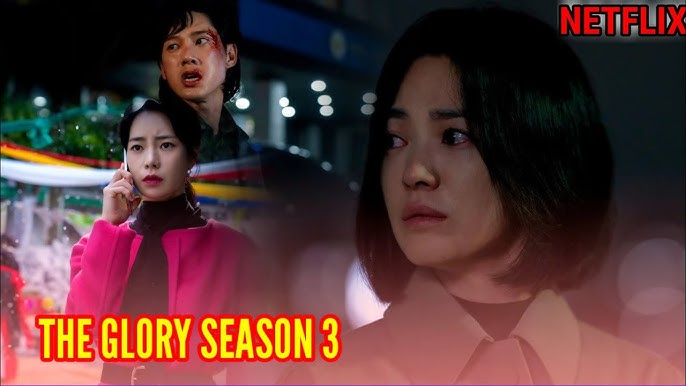The Glory Season 3 || Song Hye-kyo || Lim Ji-yeon || Lee Do-hyun

The Glory Season 3 delivers a powerful and emotionally charged conclusion to the saga of Moon Dong-eun, portrayed by Song Hye-kyo, as she embarks on her ultimate quest for revenge against the brutal bullies who shattered her life. The show has captivated audiences since its initial release, and this season brings everything full circle, with each character facing the consequences of their past actions.
In Season 3, the story takes an even darker and more intricate turn. The revenge plot that has been meticulously constructed in the previous seasons begins to come to fruition, with Dong-eun executing her plans in increasingly clever and strategic ways. The personal stakes are higher than ever, and the show’s ability to maintain tension while deepening the characters’ emotional journeys is nothing short of impressive.
Dong-eun’s tormentors—particularly Park Yeon-jin (played by Lim Ji-yeon)—are all facing their own unraveling, but the real brilliance of The Glory lies in its portrayal of complex motivations. The characters are not one-dimensional villains; they are multifaceted, and this complexity gives the show an added layer of nuance.

Song Hye-kyo continues to shine as the vengeful Dong-eun. Her portrayal of the character’s quiet determination, hidden pain, and calculated movements is deeply compelling. It’s evident that she’s invested not only in the plot but also in her character’s emotional journey. Song’s ability to convey rage without shouting and sorrow without tears showcases her mastery of subtlety.
Lim Ji-yeon is equally compelling as the cruel Park Yeon-jin. Her portrayal of a woman who is both a victim of her own circumstances and a perpetrator of extreme cruelty is brilliant. Yeon-jin’s complex emotional state—her fear of losing everything she has built, and her struggle with guilt and self-preservation—adds depth to what could otherwise have been a straightforward antagonist role.
Lee Do-hyun, who plays Joo Yeo-jeong, brings a quiet charm and sensitivity to his character. As Dong-eun’s ally, Yeo-jeong’s own background and motivations are explored more deeply this season, adding a welcome layer of complexity to his relationship with Dong-eun. Lee manages to deliver an understated yet powerful performance, offering a contrast to the intensity of the lead character’s vengeance-driven actions.


The cinematography remains as stark and atmospheric as ever. The show’s visual style—often drenched in muted tones—perfectly complements the somber tone of the story. The framing of each scene and the use of light and shadow create an immersive experience, adding to the sense of impending danger and tension that lingers throughout.
Director Ahn Gil-ho continues to expertly pace the series, ensuring that the story unfolds in a way that feels both organic and suspenseful. The themes of trauma, justice, and retribution are explored with sensitivity, but also with the intensity necessary to keep the audience on edge. There are moments of catharsis, but they are earned through the slow, deliberate development of the plot and characters.
Ultimately, The Glory Season 3 feels like a satisfying conclusion to a gripping series. It offers a blend of emotional payoff and moral complexity that will leave viewers reflecting on the choices made by each character long after the final credits roll.
The finale of The Glory leaves its viewers with a sense of both closure and lingering questions about the nature of vengeance and justice. With standout performances from Song Hye-kyo, Lim Ji-yeon, and Lee Do-hyun, and a powerful, darkly poetic narrative, this season is a testament to the strength of Korean drama in tackling complex emotional and moral issues. It may be the last chapter of Moon Dong-eun’s journey, but it’s one that will linger in the minds of viewers for a long time.











